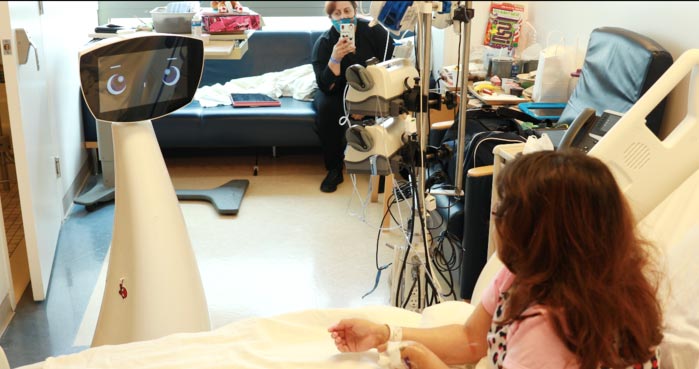A visit from a social robot improves hospitalized children’s outlook

Robin interacting with a young patient
Credit: UCLA Health
Findings suggest robot telepresence, more than a tablet, provides comfort to young patients.
A new study from UCLA finds a visit from human-controlled robot encourages a positive outlook and improves medical interactions for hospitalized children.
Robin is a social companion robot that stands at about 4 feet tall and has the capabilities to move, talk and play with others while being remotely controlled by humans. Specialists from UCLA Mattel Children’s Hospital’s Chase Child Life Program conducted hour-long video visits with young patients using Robin, comparing it to interactions using a standard tablet, from October 2020 to April 2021. At the conclusion of the study period, children and their parents were interviewed about their experiences and child life specialists provided feedback in a focus group. Researchers then used a transcript of the discussion to identify recurrent and salient themes.
Ninety percent of parents who had a visit with Robin indicated they were “extremely likely” to request another visit, compared to 60% of parents whose children interacted with the tablet. Children reported a 29% increase in positive affect – described as the tendency to experience the world in a positive way, including emotions, interactions with others and with life’s challenges – after a visit with Robin and a 33% decrease in negative affect. Children who had a tablet visit reported a 43% decrease in positive affect and a 33% decrease in negative affect.
Parents whose children had a visit from Robin reported their children had no change in positive affect and a 75% decrease in negative affect. Parents whose children had a tablet visit reported their children had a 16% increase in positive affect and no change in negative affect.
The study is being presented on October 11 at the American Academy of Pediatrics (AAP) National Conference.
Child life specialists who oversaw visits with Robin reported benefits that included a greater display of intimacy and interactivity during play, increased control over their hospital experience and the formation of a new, trusting friendship.
“Our team has demonstrated that a social companion robot can go beyond video chats on a tablet to give us a more imaginative and profound way to make the hospital less stressful,” said Justin Wagner, MD, a pediatric surgeon at UCLA Mattel Children’s Hospital and senior author of the study. “As the pandemic continues, our patients are still feeling anxious and vulnerable in a variety of ways, so it’s critical that we be as creative as possible to make their experiences easier when they need our help.”
“We saw the positive effect in children, their families and healthcare workers,” adds Wagner. The analysis also suggests benefits to staff, including an increased sense of intimacy with and focus on the patient, increased staff engagement in social care and relative ease in maintaining infection control practices.
In the study, child life specialists also reported the challenges of limited time for patient encounters and a learning curve for operating Robin.
The authors say the evidence illustrates benefits for young patients and supports the incorporation of a social robot like Robin in an inpatient pediatric multidisciplinary care setting.
The study’s other authors are Dr. Gabriel Oland, Joseph Wertz, W. Scott Comulada, Valentina Ogaryan, Megan Pike, and Dr. Shant Shekherdimian of UCLA.
Media Contact
Evelyn Tokuyama
University of California – Los Angeles Health Sciences
etokuyama@mednet.ucla.edu
All latest news from the category: Health and Medicine
This subject area encompasses research and studies in the field of human medicine.
Among the wide-ranging list of topics covered here are anesthesiology, anatomy, surgery, human genetics, hygiene and environmental medicine, internal medicine, neurology, pharmacology, physiology, urology and dental medicine.
Newest articles

High-energy-density aqueous battery based on halogen multi-electron transfer
Traditional non-aqueous lithium-ion batteries have a high energy density, but their safety is compromised due to the flammable organic electrolytes they utilize. Aqueous batteries use water as the solvent for…

First-ever combined heart pump and pig kidney transplant
…gives new hope to patient with terminal illness. Surgeons at NYU Langone Health performed the first-ever combined mechanical heart pump and gene-edited pig kidney transplant surgery in a 54-year-old woman…

Biophysics: Testing how well biomarkers work
LMU researchers have developed a method to determine how reliably target proteins can be labeled using super-resolution fluorescence microscopy. Modern microscopy techniques make it possible to examine the inner workings…





















